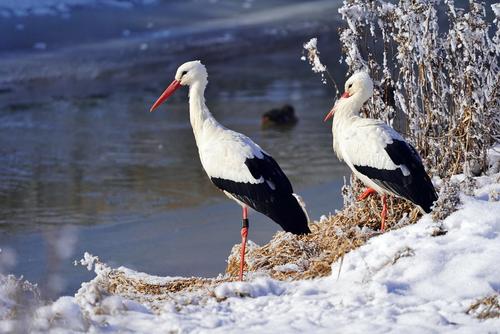The four-part webinar series on "Human impacts on the ecology of the white stork" is coming to an end. The last event will take place on Saturday, 19 February 2022 from 10 a.m. to 12 p.m. and will focus on the increasing number of migratory birds in the breeding grounds.

Two white storks in Hesse in the bitterly cold winter of 2021. Cold temperatures don't bother storks much; it becomes critical when the ground is covered in snow for a longer period of time.
© Lutz KlappIn people‘s imagination the white stork is a classic migratory bird. In the 19th century, an African arrow, found in the neck of a surviving white stork which returned to Germany, proved that white storks spend their winter in Africa. Master Adebar's return to Europe became a culturally significant event: the popular synanthrope heralded that spring has finally come.
However, the migratory behaviour of birds has long since changed in view of the climate crisis, including the white stork. It has been known for a long time that the migratory storks going west no longer take the long journey to Africa but they stay – halfway - on the Iberian peninsula. The number of overwinterers in the Central European breeding grounds has also increased continuously in recent years.
On 19 February, Peter Enggist (Stork Switzerland) and other stork experts will talk about the opportunities and risks for the white stork associated with this strategy. Please join the discussion and register for the last part of the webinar series at: storch-schweiz(at)bluewin.ch.


